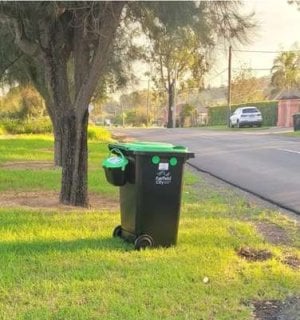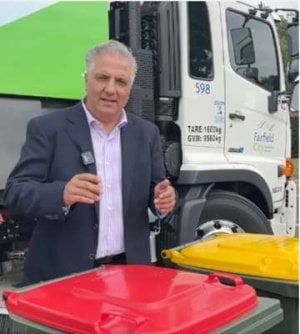A bold new waste rule is dividing communities – what it means for you
By
Maan
- Replies 24
Australians love a good debate, and nothing stirs the pot quite like a change that impacts daily life. When new initiatives roll out, they often spark a mix of excitement, confusion, and, let’s face it, a fair bit of frustration.
One recent change has ignited a heated discussion, with many questioning whether it’s the right fit for everyone. Here’s what’s happening and why it’s causing such a stir.
The introduction of environmentally friendly FOGO bins across Australian suburbs has sparked significant debate.
From complaints about food scraps attracting maggots and flies to the frustration of general waste collections being reduced to fortnightly, Aussies haven’t held back on voicing their concerns about how the initiative impacts daily life.
Now, a Western Sydney mayor who initially praised the rollout has added his voice to the critics. This comes after a proposed policy change requiring weekly compost collections for all households and businesses in New South Wales (NSW) by 2030.
NSW Environment Minister Penny Sharpe recently argued that more frequent collection of food scraps—whether in separate containers or small ‘food organics garden organics’ (FOGO) bins—would help address landfill issues.
‘Greater Sydney is running out of ways to safely manage red bin waste, and is predicted to run out of landfill capacity by 2030,’ a spokesperson for the NSW Environment Protection Authority (EPA) shared.
Food waste reportedly makes up over one-third of the average red bin’s contents. Minister Sharpe believes that enforcing the weekly FOGO collection mandate, part of the new legislation could divert approximately 950,000 tonnes of organic waste from landfills annually.
However, Fairfield Mayor Frank Carbone has pointed out a major flaw in the plan, insisting that a ‘one size fits all’ approach is not practical for every community.
Fairfield, a local government area (LGA) with some of NSW’s largest families per household, decided to retain weekly general rubbish collections alongside FOGO bins. This setup was designed to accommodate its population’s unique waste disposal needs.
Mayor Carbone explained that the proposed weekly FOGO collection would force Fairfield to switch to fortnightly red bin pickups. He noted logistical challenges, including limited capacity to service more than two bins per week due to increased population density and limited street space.
‘If we go to a weekly service for the FOGO bin we’ll be picking up 15 per cent of food scraps and 85 per cent of air and that means, quite simply, that residents will have to pay more for their service,’ he said. ‘Because the concern is that given that the waste will have to wait for two weeks, our red bin will be overflowing and it will cost a lot more for our residents.’
Mayor Carbone added that while Fairfield supports green initiatives, the community’s larger households rely heavily on red bins for general waste. He warned that reduced red bin collections might lead to contamination in FOGO bins, as residents struggle to manage their rubbish.
Councils that fail to comply with the FOGO mandate by 2030 could face penalties of up to $50,000, with an additional $50,000 daily fine for ongoing non-compliance. However, households themselves won’t face penalties for failing to meet the requirements.
Local Government NSW President Cr Darriea Turley urged the state government to keep councils involved in the planning process, acknowledging that different communities have varying needs.
‘The FOGO-mandated collection is not due to commence until 2030 for residential waste collections, giving councils and the NSW Government time to consider and address council and community concerns,’ Turley said.
The legislation includes provisions for exemptions, which could apply to entire LGAs or specific cases, such as large apartment buildings where internal infrastructure makes FOGO collections unfeasible.
‘LGNSW supports these exemption-making clauses, which recognise that all councils and communities are different, and a one size fits all approach to FOGO collection is not suitable,’ Turley added.
As councils and the state government work to refine the plan, the rollout remains a hot topic, with many calling for a tailored approach to meet the diverse needs of NSW communities.

As the debate over waste collection reforms continues, it’s clear that finding a balance between environmental goals and community needs is no easy task. Do you think a tailored approach is the way forward? Should all councils be held to the same standard? Share your thoughts in the comments below!
One recent change has ignited a heated discussion, with many questioning whether it’s the right fit for everyone. Here’s what’s happening and why it’s causing such a stir.
The introduction of environmentally friendly FOGO bins across Australian suburbs has sparked significant debate.
From complaints about food scraps attracting maggots and flies to the frustration of general waste collections being reduced to fortnightly, Aussies haven’t held back on voicing their concerns about how the initiative impacts daily life.
Now, a Western Sydney mayor who initially praised the rollout has added his voice to the critics. This comes after a proposed policy change requiring weekly compost collections for all households and businesses in New South Wales (NSW) by 2030.
NSW Environment Minister Penny Sharpe recently argued that more frequent collection of food scraps—whether in separate containers or small ‘food organics garden organics’ (FOGO) bins—would help address landfill issues.
‘Greater Sydney is running out of ways to safely manage red bin waste, and is predicted to run out of landfill capacity by 2030,’ a spokesperson for the NSW Environment Protection Authority (EPA) shared.
Food waste reportedly makes up over one-third of the average red bin’s contents. Minister Sharpe believes that enforcing the weekly FOGO collection mandate, part of the new legislation could divert approximately 950,000 tonnes of organic waste from landfills annually.
However, Fairfield Mayor Frank Carbone has pointed out a major flaw in the plan, insisting that a ‘one size fits all’ approach is not practical for every community.
Fairfield, a local government area (LGA) with some of NSW’s largest families per household, decided to retain weekly general rubbish collections alongside FOGO bins. This setup was designed to accommodate its population’s unique waste disposal needs.
Mayor Carbone explained that the proposed weekly FOGO collection would force Fairfield to switch to fortnightly red bin pickups. He noted logistical challenges, including limited capacity to service more than two bins per week due to increased population density and limited street space.
‘If we go to a weekly service for the FOGO bin we’ll be picking up 15 per cent of food scraps and 85 per cent of air and that means, quite simply, that residents will have to pay more for their service,’ he said. ‘Because the concern is that given that the waste will have to wait for two weeks, our red bin will be overflowing and it will cost a lot more for our residents.’
Mayor Carbone added that while Fairfield supports green initiatives, the community’s larger households rely heavily on red bins for general waste. He warned that reduced red bin collections might lead to contamination in FOGO bins, as residents struggle to manage their rubbish.
Councils that fail to comply with the FOGO mandate by 2030 could face penalties of up to $50,000, with an additional $50,000 daily fine for ongoing non-compliance. However, households themselves won’t face penalties for failing to meet the requirements.
Local Government NSW President Cr Darriea Turley urged the state government to keep councils involved in the planning process, acknowledging that different communities have varying needs.
‘The FOGO-mandated collection is not due to commence until 2030 for residential waste collections, giving councils and the NSW Government time to consider and address council and community concerns,’ Turley said.
The legislation includes provisions for exemptions, which could apply to entire LGAs or specific cases, such as large apartment buildings where internal infrastructure makes FOGO collections unfeasible.
‘LGNSW supports these exemption-making clauses, which recognise that all councils and communities are different, and a one size fits all approach to FOGO collection is not suitable,’ Turley added.
As councils and the state government work to refine the plan, the rollout remains a hot topic, with many calling for a tailored approach to meet the diverse needs of NSW communities.
Key Takeaways
- The rollout of FOGO bins in Australia has sparked widespread debate, with concerns ranging from pest issues to the impact of reduced general waste collections.
- Fairfield Mayor Frank Carbone criticised the proposed weekly FOGO collection mandate, citing logistical challenges and increased costs for residents, particularly in areas with larger households.
- Local Government NSW President Cr Darriea Turley emphasised the need for flexibility, highlighting that exemptions might be necessary for certain LGAs or building types where FOGO collection is impractical.
- While the legislation aims to divert significant organic waste from landfills by 2030, critics argue that a ‘one size fits all’ approach fails to account for the diverse needs of different communities.
As the debate over waste collection reforms continues, it’s clear that finding a balance between environmental goals and community needs is no easy task. Do you think a tailored approach is the way forward? Should all councils be held to the same standard? Share your thoughts in the comments below!









